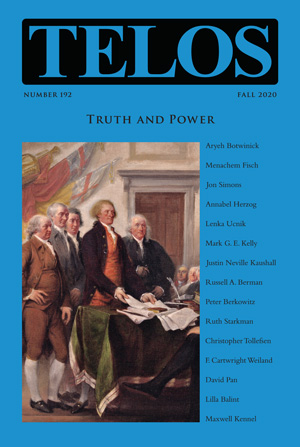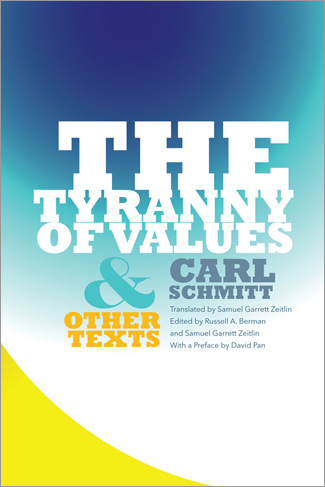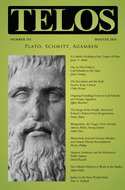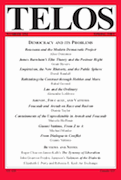By Telos Press · Tuesday, January 26, 2021 In today’s episode of the Telos Press Podcast, Camelia Raghinaru talks with Aryeh Botwinick about his article “Negative Theology, Power, and the Israeli–Palestinian Conflict,” from Telos 192 (Fall 2020). An excerpt of the article appears here. If your university has an online subscription to Telos, you can read the full article at the Telos Online website. For non-subscribers, learn how your university can begin a subscription to Telos at our library recommendation page. Purchase a print copy of Telos 192 in our online store.
Listen to the podcast here.
Continue reading →
By Telos Press · Tuesday, December 22, 2020 In today’s episode of the Telos Press Podcast, Camelia Raghinaru talks with Aryeh Botwinick about his article “Epistemological Skepticism, Textual Skepticism, and the Role of Constitutions,” from Telos 189 (Winter 2019). An excerpt of the article appears here. If your university has an online subscription to Telos, you can read the full article at the Telos Online website. For non-subscribers, learn how your university can begin a subscription to Telos at our library recommendation page. Purchase a print copy of Telos 189 in our online store.
Listen to the podcast here.
Continue reading →
By Aryeh Botwinick · Friday, November 13, 2020 Aryeh Botwinick’s “Negative Theology, Power, and the Israeli–Palestinian Conflict” appears in Telos 192 (Fall 2020): Truth and Power. Read the full article at the Telos Online website, or purchase a print copy of the issue in our online store. Individual subscriptions to Telos are available in both print and online formats.
 From a Machiavellian perspective, peace is war by other means. You can have a much greater watchful vigilance of your former (or future) opponent in times of peace than in a time of war. Israel as a sponsor (or co-sponsor) of a kind of Middle East Marshall Plan: Rebuilding your enemy so that he becomes your ally and friend. Enemies must learn to use each other’s weapons. The weakness of the Palestinians has to be matched by the deliberate, self-consciously generated weakness of the Israelis in the form of benevolence and generosity in order for both sides to emerge as triumphant. If this approach is pursued, the Israeli–Palestinian conflict harbors the prospect of turning into a sum-sum conflict, where both sides stand equally to gain by pursuing peace. From a Machiavellian perspective, peace is war by other means. You can have a much greater watchful vigilance of your former (or future) opponent in times of peace than in a time of war. Israel as a sponsor (or co-sponsor) of a kind of Middle East Marshall Plan: Rebuilding your enemy so that he becomes your ally and friend. Enemies must learn to use each other’s weapons. The weakness of the Palestinians has to be matched by the deliberate, self-consciously generated weakness of the Israelis in the form of benevolence and generosity in order for both sides to emerge as triumphant. If this approach is pursued, the Israeli–Palestinian conflict harbors the prospect of turning into a sum-sum conflict, where both sides stand equally to gain by pursuing peace.
Continue reading →
By Telos Press · Monday, December 17, 2018 New from Telos Press: The Tyranny of Values and Other Texts, by Carl Schmitt. Translated by Samuel Garrett Zeitlin, edited by Russell A. Berman and Samuel Garrett Zeitlin, and with a preface by David Pan. Order your copy in our online store, and save 20% on the list price by using the coupon code BOOKS20 during the checkout process.
 Written during the Weimar Republic, the Nazi era, and the Cold War, this collection of occasional pieces provides an instructive look at the ways in which Carl Schmitt employed his theories in order to make judgments about contemporary historical events and problems. Covering topics such as the political significance of universalism and jurisprudence, the meaning of the partisan, the world-historical significance of the Cold War, the deterioration of metaphysics into “values,” the relationship between theoretical concepts and concrete historical situations, and his views on thinkers such as Machiavelli, Bodin, and Rousseau, these essays establish a revealing counterpoint to his more formal work. They react on the one hand directly to contemporary political questions and demonstrate the way in which he saw the immediate historical significance of his ideas. On the other hand, he also feels free to provide in these pieces the kinds of methodological reflections that help us to better understand the particular epistemological framework that makes his thought so unique. Written during the Weimar Republic, the Nazi era, and the Cold War, this collection of occasional pieces provides an instructive look at the ways in which Carl Schmitt employed his theories in order to make judgments about contemporary historical events and problems. Covering topics such as the political significance of universalism and jurisprudence, the meaning of the partisan, the world-historical significance of the Cold War, the deterioration of metaphysics into “values,” the relationship between theoretical concepts and concrete historical situations, and his views on thinkers such as Machiavelli, Bodin, and Rousseau, these essays establish a revealing counterpoint to his more formal work. They react on the one hand directly to contemporary political questions and demonstrate the way in which he saw the immediate historical significance of his ideas. On the other hand, he also feels free to provide in these pieces the kinds of methodological reflections that help us to better understand the particular epistemological framework that makes his thought so unique.
Continue reading →
By Peter A. Redpath · Friday, January 27, 2012 Peter A. Redpath’s “Justice in the New World Order: Reduction of Justice to Tolerance in the New Totalitarian World State” appears in Telos 157 (Winter 2011). Read the full version online at the TELOS Online website, or purchase a print copy of the issue here.
 This article’s general thesis is that, shortly after World War II, some leading Western intellectuals started to work to build a new world order based upon a modified understanding of national sovereignty and a notion of justice that rejected Machiavellianism. It claims that during the 1960s, this project became hijacked by Western socialists and was turned toward undermining the authority of national constitutions and legal traditions and promoting Machiavellianism on a global scale. Socialists effected this transformation by wedding Nietzsche’s Machiavellianism to Rousseau’s teaching about morality. From Rousseau they adopted the notion of “tolerance”—having the right feelings and right way of reading history about an exploited, sinless, innocent class (the proletariat under communism)—to replace the classical notion of justice as a moral, behavioral, quality (habitually behaving rightly toward other people) in human affairs. Of crucial significance is that, in the process, they changed the West’s understanding of justice from a classical moral category related to behaving rightly toward others into a hermeneutical category of having the right political reading of history. This article’s general thesis is that, shortly after World War II, some leading Western intellectuals started to work to build a new world order based upon a modified understanding of national sovereignty and a notion of justice that rejected Machiavellianism. It claims that during the 1960s, this project became hijacked by Western socialists and was turned toward undermining the authority of national constitutions and legal traditions and promoting Machiavellianism on a global scale. Socialists effected this transformation by wedding Nietzsche’s Machiavellianism to Rousseau’s teaching about morality. From Rousseau they adopted the notion of “tolerance”—having the right feelings and right way of reading history about an exploited, sinless, innocent class (the proletariat under communism)—to replace the classical notion of justice as a moral, behavioral, quality (habitually behaving rightly toward other people) in human affairs. Of crucial significance is that, in the process, they changed the West’s understanding of justice from a classical moral category related to behaving rightly toward others into a hermeneutical category of having the right political reading of history.
Continue reading →
By Grant Havers · Friday, April 8, 2011 Grant Havers’s “James Burnham’s Elite Theory and the Postwar American Right ” appears in Telos 154 (Spring 2011). Read the full version at TELOS Online website.
 This article discusses the reasons for the postwar American Right’s inattention to elite theory, or the study of the relation between elites and the masses. James Burnham, the most influential elite theorist of the postwar Right, has attracted the greatest interest in his work from the Left rather than the Right. His historicist appraisal of Machiavelli’s analysis of the elitist use of ethics failed to attract “value conservatives” on the Right who believed that the preservation of “timeless” values was unrelated to elite power. While his usage of Machiavelli’s realpolitik might have attracted populists on the Right who were suspicious of elites, Burnham rejected the populist belief in the people’s “virtue.” Yet Burnham’s theory of elite power deserves two cheers from conservatives for understanding both the historic relativity of values as well as the willingness of the masses to obey the elites. Burnham’s historicism and anti-populism might have saved conservatives from pinning their hopes in either the power of values or the people to effect change. Nevertheless, Burnham’s lack of interest in the power of mass religious belief compromises the value of his understanding of power, since, unlike Machiavelli, he underestimated the degree to which popular religion can threaten the power of elites. This article discusses the reasons for the postwar American Right’s inattention to elite theory, or the study of the relation between elites and the masses. James Burnham, the most influential elite theorist of the postwar Right, has attracted the greatest interest in his work from the Left rather than the Right. His historicist appraisal of Machiavelli’s analysis of the elitist use of ethics failed to attract “value conservatives” on the Right who believed that the preservation of “timeless” values was unrelated to elite power. While his usage of Machiavelli’s realpolitik might have attracted populists on the Right who were suspicious of elites, Burnham rejected the populist belief in the people’s “virtue.” Yet Burnham’s theory of elite power deserves two cheers from conservatives for understanding both the historic relativity of values as well as the willingness of the masses to obey the elites. Burnham’s historicism and anti-populism might have saved conservatives from pinning their hopes in either the power of values or the people to effect change. Nevertheless, Burnham’s lack of interest in the power of mass religious belief compromises the value of his understanding of power, since, unlike Machiavelli, he underestimated the degree to which popular religion can threaten the power of elites.
Continue reading →
|
|


 This article’s general thesis is that, shortly after World War II, some leading Western intellectuals started to work to build a new world order based upon a modified understanding of national sovereignty and a notion of justice that rejected Machiavellianism. It claims that during the 1960s, this project became hijacked by Western socialists and was turned toward undermining the authority of national constitutions and legal traditions and promoting Machiavellianism on a global scale. Socialists effected this transformation by wedding Nietzsche’s Machiavellianism to Rousseau’s teaching about morality. From Rousseau they adopted the notion of “tolerance”—having the right feelings and right way of reading history about an exploited, sinless, innocent class (the proletariat under communism)—to replace the classical notion of justice as a moral, behavioral, quality (habitually behaving rightly toward other people) in human affairs. Of crucial significance is that, in the process, they changed the West’s understanding of justice from a classical moral category related to behaving rightly toward others into a hermeneutical category of having the right political reading of history.
This article’s general thesis is that, shortly after World War II, some leading Western intellectuals started to work to build a new world order based upon a modified understanding of national sovereignty and a notion of justice that rejected Machiavellianism. It claims that during the 1960s, this project became hijacked by Western socialists and was turned toward undermining the authority of national constitutions and legal traditions and promoting Machiavellianism on a global scale. Socialists effected this transformation by wedding Nietzsche’s Machiavellianism to Rousseau’s teaching about morality. From Rousseau they adopted the notion of “tolerance”—having the right feelings and right way of reading history about an exploited, sinless, innocent class (the proletariat under communism)—to replace the classical notion of justice as a moral, behavioral, quality (habitually behaving rightly toward other people) in human affairs. Of crucial significance is that, in the process, they changed the West’s understanding of justice from a classical moral category related to behaving rightly toward others into a hermeneutical category of having the right political reading of history.  This article discusses the reasons for the postwar American Right’s inattention to elite theory, or the study of the relation between elites and the masses. James Burnham, the most influential elite theorist of the postwar Right, has attracted the greatest interest in his work from the Left rather than the Right. His historicist appraisal of Machiavelli’s analysis of the elitist use of ethics failed to attract “value conservatives” on the Right who believed that the preservation of “timeless” values was unrelated to elite power. While his usage of Machiavelli’s realpolitik might have attracted populists on the Right who were suspicious of elites, Burnham rejected the populist belief in the people’s “virtue.” Yet Burnham’s theory of elite power deserves two cheers from conservatives for understanding both the historic relativity of values as well as the willingness of the masses to obey the elites. Burnham’s historicism and anti-populism might have saved conservatives from pinning their hopes in either the power of values or the people to effect change. Nevertheless, Burnham’s lack of interest in the power of mass religious belief compromises the value of his understanding of power, since, unlike Machiavelli, he underestimated the degree to which popular religion can threaten the power of elites.
This article discusses the reasons for the postwar American Right’s inattention to elite theory, or the study of the relation between elites and the masses. James Burnham, the most influential elite theorist of the postwar Right, has attracted the greatest interest in his work from the Left rather than the Right. His historicist appraisal of Machiavelli’s analysis of the elitist use of ethics failed to attract “value conservatives” on the Right who believed that the preservation of “timeless” values was unrelated to elite power. While his usage of Machiavelli’s realpolitik might have attracted populists on the Right who were suspicious of elites, Burnham rejected the populist belief in the people’s “virtue.” Yet Burnham’s theory of elite power deserves two cheers from conservatives for understanding both the historic relativity of values as well as the willingness of the masses to obey the elites. Burnham’s historicism and anti-populism might have saved conservatives from pinning their hopes in either the power of values or the people to effect change. Nevertheless, Burnham’s lack of interest in the power of mass religious belief compromises the value of his understanding of power, since, unlike Machiavelli, he underestimated the degree to which popular religion can threaten the power of elites. 

